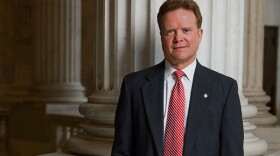Virginia Democratic Senator Mark Warner says Congress has failed to adapt to the new digitized economy, and he’s pushing to provide a safety net for millennials.
Senator Warner helped found Nextel and it made him a millionaire. That elite status has allowed him to rent houses in Europe. But now the rest of us can do that too through websites like AirBnB. Warner thinks that's great.
“This model has been out there for 20 years at the high end. This is really simply democratizing the ability to rent out your home for a much broader market.”
Warner now regularly uses Uber - that app that allows you to find a driver close to you and pay them without even opening up your wallet. Uber drivers, like people who get income from renting their place on AirBnB, fall into a new category - the so-called gig economy. Warner is calling for the federal government to adapt its policies to that new economy before they get left behind.
“Six months ago I had never heard the term the gig economy. And I suddenly, once I heard it and whether you call it gig or sharing or on demand economy, once I was attuned to it, suddenly I picked it up every day. There was a story somewhere. You had to look.”
Warner recently went to a brain storming meeting with millennials at We Work D.C. - an incubator for startups. Think of it as a slice of Silicon Valley in the nation's capital. Most of the dozens of attendees were rocking shorts, sandals, or sun dresses as a dog walked around like it owned the place - even barking during the senator's address. Carl Pierre is the Head of Operations at We Work. He recognizes the risk that many of his counterparts are opening themselves up to.
“I mean part of the allure of being an entrepreneur is understanding that there is inherent risk to it. In fact, there’s like a ton of risk. Um but that kind of adds on to the thrill of success and makes those lows and highs that much appreciated.”
That said, Pierre says Congress still can make life easier on the new, more entrepreneurial generation.
“I think Congress needs to be way more nimble to catch up because you have all these disruptive things but you know on… it’s a two edged sword. Like yeah they’re disruptive but also Congress needs to catch up to help out with regulations and make sure these businesses are safe and sound and the practices that they go through so.”
Warner is one of the few voices in Congress calling for a rethinking of the relationship between the government and today's workforce.
“This is a fundamental shift and a disaggregation between an employer and an employee that is as dramatic as the telecom and wireless revolution was in the 80s and the IT revolution was in the 90s. And it struck me that you know 25 people running for President and nobody’s talking about this.”
Some estimates are that one third of Americans fit into this new category, including people cobbling together low wage earnings from two or three jobs just to scrape by. Warner says Congress has failed to adapt to this new world.
“These millennials, 80 million strong, the largest age cohort in America, it’ll be 75% of the workforce in the next ten years. Many of them have no safety net at all. They haven’t paid into unemployment. They haven’t paid into workman’s comp. If they don’t file a 10-99, they’re not even paying into social security. So they may be doing very well but if they hit a bump in the road, they have no traditional safety net because there is no social contract.”
Warner isn't proposing any policy yet - he's more on a listening tour and fact finding mission. To start he says the government is behind when it comes to collecting data on today’s workforce. Take the Department of Labor. It only uses about 900 different job descriptions, which Warner says is outdated.
“LinkedIn uses 57,000 different variables. If we can use combined government data with some of these private platforms and better link someone that’s unemployed to a job in a quicker fashion that saves the government a lot of money. It obviously helps that person get back into the workforce.”
Warner says adapting to this new economy is a bipartisan problem, and he's hoping to get it on the radar of one of those 25 or so people running for president.





